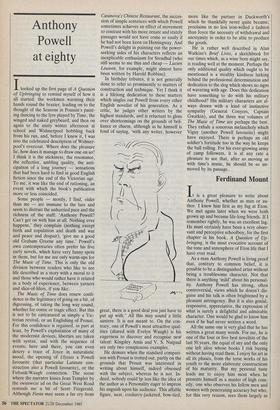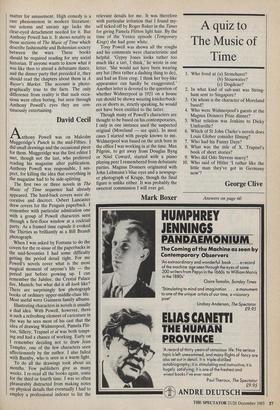t is a great pleasure to write about Anthony Powell,
whether as man or au- thor. I knew him first as my fag at Eton. We met again later when we were both grown up and became life-long friends. If I remember rightly, he was an excellent fag. He must certainly have been a very obser- vant and perceptive schoolboy, for the first chapter in his book, A Question of Up- bringing, is the most evocative account of the tone and atmosphere of Eton life that I have ever read.
As a man Anthony Powell is living proof that, contrary to common belief, it is possible to be a distinguished artist without being a troublesome character. Not that there is anything `mild' about his personal- ity. Anthony Powell has strong, often controversial, views which he doesn't dis- guise and his talk is often brightened by a pleasant astringency. But it is also genial, responsive, appreciative, the expression of what is surely a delightful and admirable character. One would be glad to know him even if he had never written a word.
All the same one is very glad that he has written a great many words. For me, he is one of the four or five best novelists of the last 50 years, the equal of any and the only one left alive whose books I risk buying without having read them. I enjoy his art in all its phases, from the terse works of his youth to the more elaborate constructions of his maturity. But my personal taste leads me to enjoy him most when he presents himself as a master of high com- edy, one who observes his fellow men and women with penetrating accuracy but who, for this very reason, sees them largely as matter for amusement. High comedy is a rare phenomenon in modern literature: our solemn and uneasy age lacks the clear-eyed detachment needed for it. But Anthony Powell has it. It shows notably in those sections of The Music of Time which describe fashionable and Bohemian society between the wars. These books should be required reading for any social historian. If anyone wants to know what it was like then to attend a debutante dance, and the dinner party that preceded it, they should read the chapters about them in A Buyer's Market. The account is photo- graphically true to the facts. The only difference from reality is that such occa- sions were often boring, but seen through Anthony Powell's eyes they are con- tinuously entertaining.
David Cecil



















































































 Previous page
Previous page